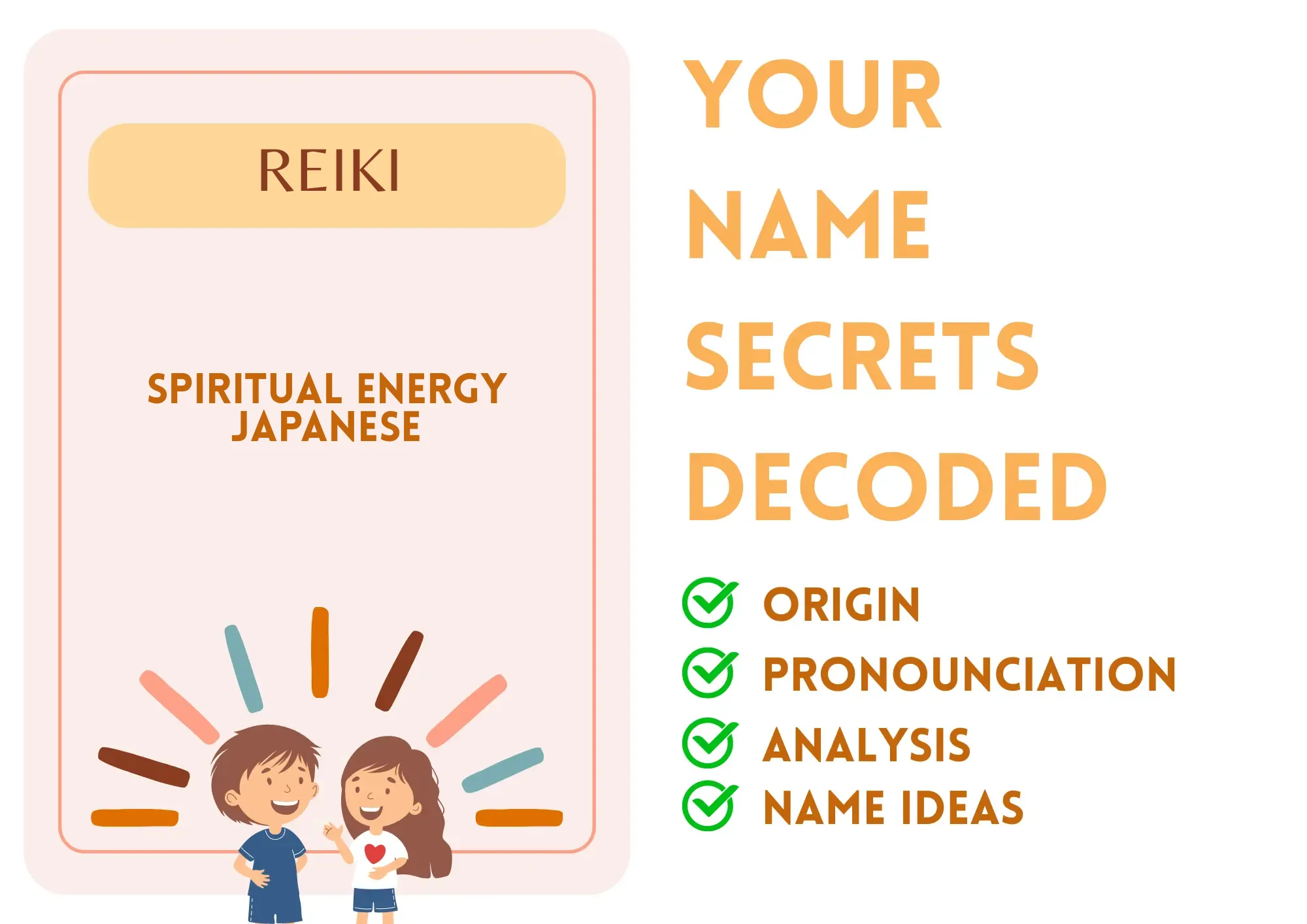
Reiki
Reiki is a name derived from the Japanese healing practice that employs energy healing techniques to promote physical and emotional well-being. The term 'Reiki' translates to 'spiritual energy' (Rei meaning 'spirit' and Ki meaning 'energy'). While traditionally associated with holistic health and wellness, it has started to be recognized as an individual given name, especially among spiritually inclined communities.
The name Reiki has a modern appeal and is primarily unisex, attracting individuals who value holistic health practices. It evokes feelings of peace, spirituality, and healing, making it a favored choice among parents wanting to instill these qualities in their child's identity.
Reiki may not have deep historical significance as a traditional name but represents a growing recognition of alternative wellness in contemporary culture. In popular culture, Reiki is often referenced in discussions about meditation, holistic healing, and spiritual growth.
Basic Information
Gender: Unisex
Sounds Like: RAY-key
Pronunciation Explanation: The first syllable is pronounced like 'Ray,' while the second syllable is pronounced 'key' as in the word for a small metal instrument used to open locks.
Summary and Meaning
Meaning: spiritual energy (Japanese)
Origin: The name Reiki originates from Japan, linked to the Japanese practice of energy healing.
Usage: Reiki is considered unisex, appealing equally to both genders.
Name Number (Chaldean)
Name Number (Pythagorean)
Popularity (Global Rank)
Overall: 40202
Boys: 45944
Girls:
Most Popular in
Religious and Cultural Significance
Religion: Buddhism
Background: Reiki has connections to spiritual practices found in Buddhism, where energy healing is a significant aspect of meditation and holistic strategies.
Cultural Significance: In Japanese culture, especially within spiritual and wellness circles, Reiki symbolizes health, balance, and a harmonious life, attracting those who seek a deeper connection to their spiritual selves.
Historical Significance: While not a historically significant name in the traditional sense, Reiki as a practice was developed in the early 20th century by Mikao Usui. Its incorporation into modern lifestyles reflects a shift towards integrating spirituality with everyday health and wellness.
Popular Culture
Literature and Mythology: Reiki has been featured in various self-help and wellness literature, often highlighting its benefits for mental and physical health.
Movies and Television: References to Reiki as a healing practice can be found in various documentaries and wellness programs, promoting its significance in holistic practices.
Feelings and Perceptions
Perception: Reiki is generally perceived in a positive light, with associations of tranquility, healing, and spiritual balance. It attracts individuals who are open to new-age practices and holistic health.
Positive Feelings: Spiritual, calming, healing, holistic, connected.
Negative Feelings: Some might view it as unconventional or skeptical due to its newer popularity in Western culture.
Practical Considerations
Ease of Writing and Calling: Reiki is easy to write and pronounce, consisting of five letters and two syllables, making it straightforward for people to remember and say.
Common Typos and Misspellings: Reike,Rayki,Reeky,Rikey
Common Nicknames: Ray,Key,Rei
Reiki Popularity
Reiki Usage and Popularity By Country
| Country | Rank (Overall) |
|---|---|
| Brunei | 4178 |
| Argentina | 4467 |
| Japan | 4614 |
| Jordan | 5790 |
| Paraguay | 6725 |
| Chile | 7322 |
| Croatia | 7345 |
| Luxembourg | 7707 |
| Spain | 8158 |
| Serbia | 8649 |
Reiki Usage and Popularity By City
| City | Rank (Overall) |
|---|---|
| New York | 17079 |
| New Delhi | 9869 |
| Portland | 6589 |
| Los Angeles | 20184 |
| Minneapolis | 8985 |
| Miami | 13182 |
| San Francisco | 22258 |
| Paris | 21699 |
| La Mancha Blanca | 843 |
| The Hague | 7419 |
Compatibility Analysis
Famous Persons Named Reiki
Related Names
Similar Sounding Names:
Riki,Reiko,Raina,Rei
Similar Meaning and Related Names:
Sibling Name Ideas (Brothers):
Ren ♀️
Buddhist, Shinto (Japanese), Confucian (Korean)